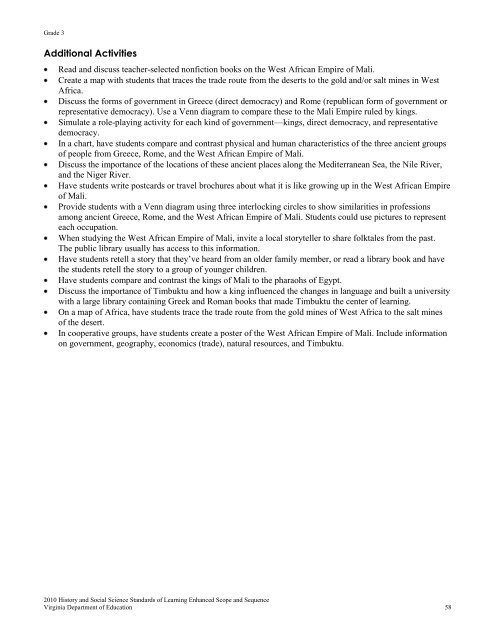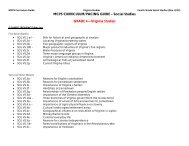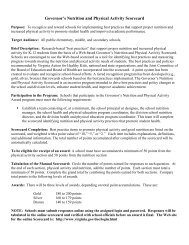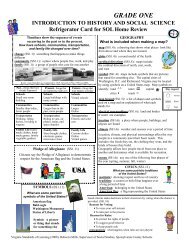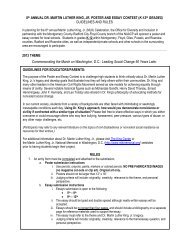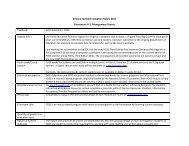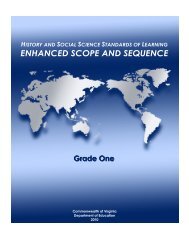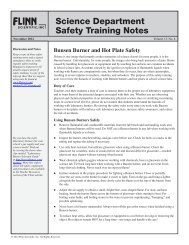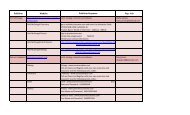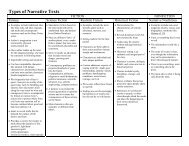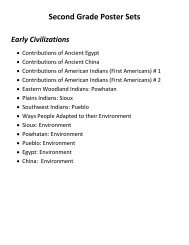Enhanced Scope and Sequence - Virginia Department of Education ...
Enhanced Scope and Sequence - Virginia Department of Education ...
Enhanced Scope and Sequence - Virginia Department of Education ...
You also want an ePaper? Increase the reach of your titles
YUMPU automatically turns print PDFs into web optimized ePapers that Google loves.
Grade 3<br />
Additional Activities<br />
Read <strong>and</strong> discuss teacher-selected nonfiction books on the West African Empire <strong>of</strong> Mali.<br />
Create a map with students that traces the trade route from the deserts to the gold <strong>and</strong>/or salt mines in West<br />
Africa.<br />
Discuss the forms <strong>of</strong> government in Greece (direct democracy) <strong>and</strong> Rome (republican form <strong>of</strong> government or<br />
representative democracy). Use a Venn diagram to compare these to the Mali Empire ruled by kings.<br />
Simulate a role-playing activity for each kind <strong>of</strong> government—kings, direct democracy, <strong>and</strong> representative<br />
democracy.<br />
In a chart, have students compare <strong>and</strong> contrast physical <strong>and</strong> human characteristics <strong>of</strong> the three ancient groups<br />
<strong>of</strong> people from Greece, Rome, <strong>and</strong> the West African Empire <strong>of</strong> Mali.<br />
Discuss the importance <strong>of</strong> the locations <strong>of</strong> these ancient places along the Mediterranean Sea, the Nile River,<br />
<strong>and</strong> the Niger River.<br />
Have students write postcards or travel brochures about what it is like growing up in the West African Empire<br />
<strong>of</strong> Mali.<br />
Provide students with a Venn diagram using three interlocking circles to show similarities in pr<strong>of</strong>essions<br />
among ancient Greece, Rome, <strong>and</strong> the West African Empire <strong>of</strong> Mali. Students could use pictures to represent<br />
each occupation.<br />
When studying the West African Empire <strong>of</strong> Mali, invite a local storyteller to share folktales from the past.<br />
The public library usually has access to this information.<br />
Have students retell a story that they’ve heard from an older family member, or read a library book <strong>and</strong> have<br />
the students retell the story to a group <strong>of</strong> younger children.<br />
Have students compare <strong>and</strong> contrast the kings <strong>of</strong> Mali to the pharaohs <strong>of</strong> Egypt.<br />
Discuss the importance <strong>of</strong> Timbuktu <strong>and</strong> how a king influenced the changes in language <strong>and</strong> built a university<br />
with a large library containing Greek <strong>and</strong> Roman books that made Timbuktu the center <strong>of</strong> learning.<br />
On a map <strong>of</strong> Africa, have students trace the trade route from the gold mines <strong>of</strong> West Africa to the salt mines<br />
<strong>of</strong> the desert.<br />
In cooperative groups, have students create a poster <strong>of</strong> the West African Empire <strong>of</strong> Mali. Include information<br />
on government, geography, economics (trade), natural resources, <strong>and</strong> Timbuktu.<br />
2010 History <strong>and</strong> Social Science St<strong>and</strong>ards <strong>of</strong> Learning <strong>Enhanced</strong> <strong>Scope</strong> <strong>and</strong> <strong>Sequence</strong><br />
<strong>Virginia</strong> <strong>Department</strong> <strong>of</strong> <strong>Education</strong> 58


